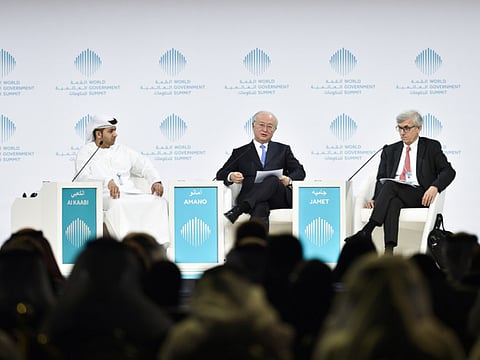Safety is key for nuclear plants, says IAEA head
Radioactive waste can be buried to avoid human exposure, world summit hears

Dubai: Spent radioactive nuclear rods expelled from the world’s 440 nuclear power plants can be safely disposed of thanks to a new deep-earth geological facility that is expected to open in Finland in 2022, says the world’s top nuclear official.
Radioactive waste will be buried deep within shields of rock where the plan is that it will be undisturbed for one million years to avoid human exposure.
In the UAE, the Western Region Barakah nuclear plant is on track for completion in 2020. With four reactors online, the facility will deliver up to a quarter of the UAE’s electricity needs and save up to 12 million tonnes in carbon emissions every year.
The first of the four reactors is expected to go online this year.
Yukiya Amano, Director of the International Atomic Energy Agency, told delegates on Tuesday on the final day of the World Government Summit that contrary to some global public health concerns, burying high-level nuclear waste deep in the earth is a safe measure.
“It is difficult to deal with higher levels of waste, spent fuel,” Amano said. “There is a way, geological disposal.”
Amano said in “Finland, a project is making very good progress. It’s due to start operating in 2022”.
Spent rods with lower and medium levels of radioactive materials are easier to dispose of, he said.
There are 60 such nuclear reactors now under construction around the world with the help and guidance of IAEA, he said.
Amano said that the IAEA has been “working in close cooperation” with the UAE since the Barakah project started to ensure highest levels of safety and proper training.
Phillipe Jamet, former commissioner to the French Nuclear Safety Authority, told summit delegates that “there is a need for a huge investment in safety. I don’t think a country can acquire nuclear without technical confidence”.
Revised UAE nuclear power safety measures prompted by the Japanese nuclear disaster five years ago will bolster the Western Region’s Barakah nuclear power plant’s capacity to withstand extreme events.
Stricter measures stem from a UAE review following the catastrophic failure of the Japanese Fukushima Daiichi nuclear power plant on March 11, 2011 when it was swamped by an earthquake-triggered tsunami.
Christer Viktorsson, Director-General of the UAE’s Federal Authority for Nuclear Regulation (FANR), said in an earlier interview that creating a safety culture in the UAE nuclear industry is paramount to avoiding such a tragedy from being repeated here in the face of extreme natural disasters.
“A strong safety culture is critical to the success of nuclear energy in the UAE. At the FANR, we aim to instill values and behaviour that prioritise the protection of the UAE’s residents and environment above any competing interests,” said Viktorsson.



